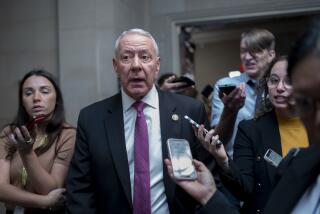Chafee New Center of GOP Concern
WASHINGTON — President Bush moved quickly to shore up his relationships with the Senate’s new power brokers this week, dining with maverick Republican John McCain on Tuesday night and new Majority Leader Tom Daschle (D-S.D.) on Thursday night.
And then there was the 20 minutes he set aside Thursday afternoon for Republican Sen. Lincoln Chafee of Rhode Island, a back-bencher with more experience shoeing horses than passing laws.
The meeting earned Chafee an invitation to a CNN interview show, where he described his discussions with Bush as “businesslike.” It was just the latest in a string of Chafee appearances on television news shows this week, a media spotlight that would have been unimaginable for him just a few weeks ago.
Soft-spoken and courteous, Chafee arrived in the Senate about a year and a half ago when he was appointed to fill a vacancy created by the death of his father, Sen. John H. Chafee (R-R.I.). Many considered the younger Chafee a lightweight.
But with the exception of Sen. James M. Jeffords of Vermont--whose defection from the GOP triggered Democratic control of the Senate this week--no lawmaker has moved so swiftly from the shadows into the spotlight as Chafee.
Jeffords and Chafee have a great deal in common. Both are part of a proud New England tradition of Republican moderates. Both come from families with deep GOP roots. Both oppose almost every key piece of Bush’s agenda. And both were courted intensively by Democrats in recent months.
All of which makes many on Capitol Hill wonder whether Chafee will be the next to go.
Chafee, 48, said he gave serious consideration to leaving. After one session with Democratic leaders, he said he sat down in his office with a legal pad, drew a line down the center and started writing down the pros and cons.
In the end, he decided against switching parties, largely because one thought kept creeping into his head: “What would my father think?”
Family considerations loom large for Chafee, a scion of one of Rhode Island’s “Five Families” that settled the state. His father became a legendary political figure. A Marine veteran who fought in World War II and Korea, John H. Chafee was elected Rhode Island’s governor three times and its senator four times.
Lincoln Chafee took a decidedly different path. After graduating from Brown University in 1975, he headed to Montana to study horseshoeing. He spent the next seven years working at harness racing tracks.
He returned to Rhode Island and briefly worked for General Dynamics Corp. before being elected in 1992 to his first of four terms as mayor of Warwick. With his father set to retire in 2000, he planned to run for the seat. When John H. Chafee died in October 1999, Lincoln Chafee was appointed to serve out the remainder of his term.
“In the beginning, he was understandably very quiet,” said one of his closest Senate colleagues, Susan Collins (R-Maine). “He was learning the ropes.”
Chafee, benefiting from his incumbent’s perch as well as feuding among Rhode Island Democrats, won handily in a state that voted overwhelmingly for Al Gore in the presidential race. Since then, he has seemed increasingly assertive.
“I definitely want to speak up and represent the moderate wing of the party,” Chafee said. “I do see that as my role--countering the shift we’ve seen in the party to the right.”
Chafee has sided with his party on some measures, including the repeal of ergonomics rules and the nomination of John Ashcroft for attorney general. But more notable has been his opposition to much of Bush’s agenda--he and McCain of Arizona were the only two Senate Republicans voting against the tax cut bill Bush signed into law Thursday.
Asked recently to name a point of agreement with Bush, Chafee named the president’s free-trade policies. Asked for other examples, he raised his eyes toward his office’s ceiling and said, “I’m sure there are areas to look at. The president’s commitment to national parks?”
Still, Rhode Island political observers say they don’t expect Chafee to abandon the GOP, and that there are plenty of reasons for him to stay put.
“It would actually make him more vulnerable politically if he became a Democrat,” said Darrell West, a political science professor at Brown University. “I don’t see any Democrat beating Chafee in a general election. But in a [Democratic] primary, there are several candidates who would be competitive.”
And for all the similarities between Chafee and Jeffords, there are important differences. Jeffords made his switch near the end of his career, worn down after 25 years of trying to move his party to the center. Chafee, by contrast, is still a newcomer to the Capitol, full of energy.
Chafee was there at the moment many consider his party’s turning point. He was 11 when his father took him to the 1964 Republican National Convention, where conservatives nominated Sen. Barry Goldwater of Arizona and booed centrist New York Gov. Nelson A. Rockefeller off the stage.
Having seen a party swerve so violently in one direction, Chafee sees no reason it can’t come back. Skeptics find his view naive.
“It’s just not going to happen,” West said.
But Chafee clings to his optimism.
“I’m a long-term thinker,” Chafee said. The ranks of Republican moderates may have grown thin on Capitol Hill, but he insisted, “We’ll be able to grow that group again.”
More to Read
Get the L.A. Times Politics newsletter
Deeply reported insights into legislation, politics and policy from Sacramento, Washington and beyond. In your inbox three times per week.
You may occasionally receive promotional content from the Los Angeles Times.










